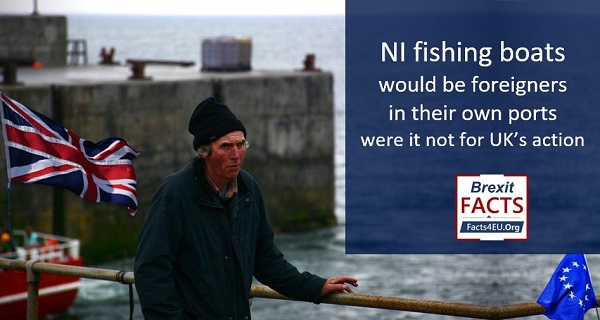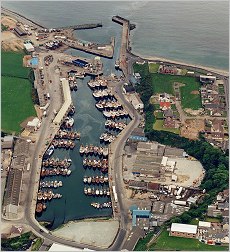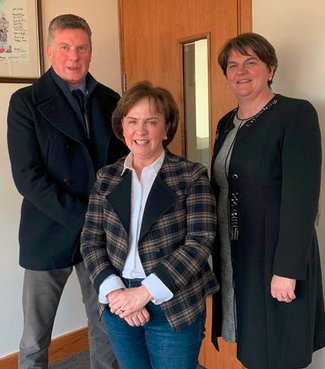A fishy tale only the EU could conceive of
NI fishing boats would be foreigners in their own ports were it not for UK’s action

Montage © Facts4EU.Org 2022
Facts4EU uncovers the most bizarre EU Protocol rule yet
The more anyone studies the detail of the Northern Ireland Protocol the more its potential for real economic harm is revealed. Facts4EU has been investigating the Protocol’s arrangements for fishing and today is able to report just how unworkable the existing arrangement is.
We spoke exclusively to the CEO of the Anglo North Irish Fish Producers Organisation and below we reveal the truth – from those in a position to know. If you think the Protocol is bad now, just wait until the grace period ends.
A fishy tale only Brussels could conceive of
The southernmost town in Northern Ireland is Kilkeel, County Down. Facing out to the Irish Sea, its harbour shelters the largest fishing fleet in Northern Ireland.
If the letter of the law in the Northern Ireland Protocol were to be applied, any trawler registered and based in Kilkeel setting off and catch its legitimate quota in British fishing grounds would not be allowed back into its own port to land its catch. Not without complying with additional and substantial EU bureaucracy.
The reason is simple. This Northern Irish (British) boat would, on leaving its own port in a part of the United Kingdom, instantly become a boat from an EU “third country” and not have authority to do so.
Photo right: Kilkeel, Northern Ireland

This will happen all over Northern Ireland’s coast
Any Northern Ireland fishing boat from any Northern Ireland port would – if the EU’s Protocol were applied as written – face the same problem. In such circumstances boats would have the option to land their catches at a British mainland port in Scotland such as Campbeltown, Troon or Fleetwood.
For any catch landed at a British mainland port to go to Northern Ireland would require the completion of customs forms countersigned by a vet as an independent witness.
The only reason this chaos has not yet arisen is because the UK Government insisted upon introducing a six-month ‘grace period’ whereby the EU’s Protocol rules would not be applied by the UK authorities. This was against the will of the EU, however, who objected.
At the end of the first six-month grace period the UK Government extended it indefinitely. Nevertheless it remains under the sufferance of the EU’s objections and could yet end up before the EU’s Courts of Justice in Luxembourg.
Alan McCulla, CEO of ANIFPO commented exclusively to Facts4EU.Org
“The majority of fishermen here voted Leave in 2016 and despite the challenges would do so again if asked. Historic EU quota-sharing arrangements that penalised Northern Ireland’s fishermen in favour of their southern colleagues has ended and in fact we have an increased share of catches in the Irish Sea.
“However, the hypocrisy of politicians who trumpet the narrative the Protocol has avoided a hard land border, while burying the fact that it has failed to avoid a hard sea border for our fishing industry, is stark. The fact that for our industry the situation could get worse is not something London, Dublin or Brussels want to discuss.

Alan McCulla of ANIFPO, with then DUP Leader Arlene Foster MLA & Diane Dodds MEP
“We really do want to see the Brexit arrangements work for all parts of the UK and indeed Ireland. However, the various grace periods, dovetailing with an overall strategy designed to ‘kick the can down the road’ is hiding what could well happen in the longer term.
“The UK Government has adopted a unilateral approach that conveniently cushions Northern Ireland’s fishing fleet from the worst aspects of the Protocol. The Protocol sets out arrangements that if implemented in their entirety will mean that Northern Ireland fishermen will be treated as foreigners in their own land.
“We continually highlight this to officials and politicians alike who do not dispute what is a fact. What puzzles us can be their answer; ‘now isn’t the time to raise these issues in the negotiations.’
“What we don’t hear is when they judge will be the time? Hence our conclusion that the strategy is simply to kick the can down the road. Actions do speak louder than words and here is one example where there has been a lot of words.”
- Alan McCulla, CEO, Anglo North Irish Fish Producers Organisation (ANIFPO), speaking to Facts4EU.Org, 10 May 2022
There is a hard border – it’s a hard sea border
Over centuries, fishing grounds around the islands of Ireland and Great Britain became established and were commonly shared and accessed even though the majority of the island of Ireland left the United Kingdom in 1922. Boats from the Republic of Ireland and Northern Ireland still accessed each other’s waters, irrespective of the EU.
Now, following the Protocol that was introduced to prevent a “hard border” on land, there is a hard sea border between Ireland’s (the EU’s) 6 and 12 mile territorial waters. Northern Ireland boats cannot fish in the Republic of Ireland’s waters and likewise the Irish cannot fish in British waters.
The Northern Ireland fishermen advised the EU and British officials that this would become a problem in what were the traditional fishing grounds. In the typical fashion of technocrats, however, the reality of fishing at sea and all the customs and practices going with it were ignored. Now there is a hard sea border.
The EU does not like the UK’s ‘grace period’
EU officials have already produced an inspection (Commission Control) report highly critical of the UK’s customs regime at Northern Irish ports and the use of the grace periods. That report will be followed up with another inspection report. The EU will not let this issue drop.
While the UK Government prevaricates about invoking the perfectly legal process of Article 16, the EU has already once sought to invoke it itself. It did so over Covid vaccines without even contacting the British or Irish Governments. It has subsequently threatened legal action on the UK Government’s ‘grace periods’. The UK Government might prevaricate but the EU does not.
Why is nobody talking about this?
The continued existence of the ‘grace period’ – and what would happen if the current period is ended by EU action – remains a live issue. It is not being considered and it is giving a false perception of the workability of the EU’s Protocol rules.
The reality of the Protocol, were it to work as written, is that Northern Ireland boats would be more likely to land their catches on Britain’s mainland rather than back in their own ports. Already one County Antrim-based fish processor has admitted that one day it may be forced to consider relocating out of Northern Ireland over to Scotland or England as that is where the fish would be taken.
Transporting fish landed in mainland GB back by ferry to be processed in NI - and then NI fish processors sending it back by ferry to mainland GB supermarkets - would not make economic sense. The effect on this part of the NI economy would be significant.
Observations
How long can the Protocol last if the grace period is abolished?
Weeks? Days? That is the question those on the ground – or at sea – are asking themselves. The fishermen know from their daily experience that it is ONLY the existence of a grace period, (whereby the Protocol is not applied to its full extent), that has prevented economic chaos and accompanying hardship.
The more the detail of the Northern Ireland Protocol is digested and understood, the worse its potential to do real damage can be seen.
As stated in our previous reports about the NI Protocol, it is a threat to the constitutional position of Northern Ireland in the UK. It has been allowed to supersede the Acts of Union that established open free trade between Northern Ireland and Great Britain.
Furthermore it is a threat to the Belfast/Good Friday Agreement and peace itself, because it was applied without the consent of the Northern Irish people. It is also an economic threat to Northern Ireland because there is clear evidence that it is distorting trading patterns. It impacts on businesses and consumers alike and results in some goods no longer being available in Northern Ireland or some GB businesses choosing not to trade with Northern Ireland companies. All of these points are grounds enough to invoke Article 16 of the Protocol so it can be replaced.
The British Government has itself said there are grounds to invoke Article 16 but it continues to avoid doing so.
Now we learn of the potential impact on NI fisheries
The Protocol’s real potential to harm fishing is just one of many examples that applies to the movement of foods under its rules (such as sausages or chilled ready-cooked meals). This has seen lorries refused entry at Northern Irish ports and having to go back on the next ferry to mainland Britain if paperwork is strictly applied, such as the wrong colour of ink pen used.
The UK Government’s unilateral grace period is only operating under sufferance of the EU and could be challenged again at any time. Its removal hangs like a ‘Sword of Damocles’ over Northern Ireland businesses – surely a situation that cannot be allowed to continue? If the grace periods are so necessary (and they are) then it points to the failure of the Protocol and why it must be ended.
Researching such information does not come cost free…
Facts4EU.Org needs you today
We are a 'not for profit' team (we make a loss) and any donation goes towards the actual work, not plush London offices, lunch or taxi expenses, or other luxuries of some organisations.
We badly need more of our thousands of readers to donate. Could this be you, today? Maybe you've been thinking about it, but just haven't got around to doing it? If so, let us reassure you. It's quick and easy and we use two highly secure payment providers. And we do NOT ask you for further donations if you donate once - we just hope that you keep supporting us. Your donation stays anonymous unless you tell us otherwise.
Please don't assume that other people will keep us going - we don't receive enough to survive and we need your help today. Could you help us?
Most of our readers are well-informed and appreciate our fact-based articles, presented in a way you won't see anywhere else. If you value reports like the one above, please help our work with a donation. We have far more to do in researching, publishing, campaigning and lobbying Parliament than we have in terms of the financial resources to fulfil these tasks. We badly need funding to continue - we rely 100% on public donations from readers like you.
If you believe in a fully-free, independent, and sovereign United Kingdom, please make a donation now. It’s quick, secure, and confidential, and you can use one of the links below or you can use our Donations page here. You will receive a personal, friendly ‘thank you’ from a member of our team within 24 hours. Thank you for reading this.
[ Sources: EU Commission & Northern Ireland official websites | interview with Alan McCulla of ANIFPO ] Politicians and journalists can contact us for details, as ever.
Brexit Facts4EU.Org, Wed 11 May 2022
Click here to go to our news headlines
Please scroll down to COMMENT on the above article.
And don't forget to actually post your message after you have previewed it!
Since before the EU Referendum, Brexit Facts4EU.Org
has been the most prolific researcher and publisher of Brexit facts in the world.
Supported by MPs, MEPs, & other groups, our work has impact.
We think facts matter. Please donate today, so that we can continue to ensure a clean Brexit is finally delivered.
Paypal Users Only - Choose amount first
Quick One-off
Monthly


Something to say about this? Scroll down for reader comments